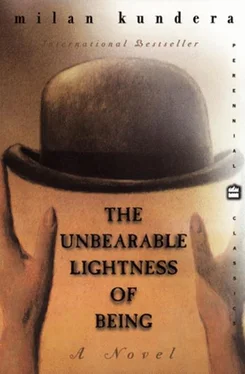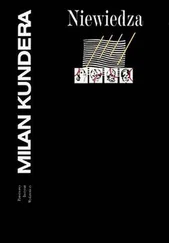Milan Kundera - The Unbearable Lightness of Being
Здесь есть возможность читать онлайн «Milan Kundera - The Unbearable Lightness of Being» весь текст электронной книги совершенно бесплатно (целиком полную версию без сокращений). В некоторых случаях можно слушать аудио, скачать через торрент в формате fb2 и присутствует краткое содержание. Жанр: Современная проза, на английском языке. Описание произведения, (предисловие) а так же отзывы посетителей доступны на портале библиотеки ЛибКат.
- Название:The Unbearable Lightness of Being
- Автор:
- Жанр:
- Год:неизвестен
- ISBN:нет данных
- Рейтинг книги:3 / 5. Голосов: 2
-
Избранное:Добавить в избранное
- Отзывы:
-
Ваша оценка:
- 60
- 1
- 2
- 3
- 4
- 5
The Unbearable Lightness of Being: краткое содержание, описание и аннотация
Предлагаем к чтению аннотацию, описание, краткое содержание или предисловие (зависит от того, что написал сам автор книги «The Unbearable Lightness of Being»). Если вы не нашли необходимую информацию о книге — напишите в комментариях, мы постараемся отыскать её.
The Unbearable Lightness of Being — читать онлайн бесплатно полную книгу (весь текст) целиком
Ниже представлен текст книги, разбитый по страницам. Система сохранения места последней прочитанной страницы, позволяет с удобством читать онлайн бесплатно книгу «The Unbearable Lightness of Being», без необходимости каждый раз заново искать на чём Вы остановились. Поставьте закладку, и сможете в любой момент перейти на страницу, на которой закончили чтение.
Интервал:
Закладка:
Tomas straightened up and, distractedly, listened to Sabina's words.
What are you looking for? she asked.
A sock.
She searched all over the room with him, and again he got down on all fours to look under the table.
Your sock isn't anywhere to be seen, said Sabina. You must have come without it.
How could I have come without it? cried Tomas, looking at his watch. I wasn't wearing only one sock when I came, was I?
It's not out of the question. You've been very absent-minded lately. Always rushing somewhere, looking at your watch. It wouldn't surprise me in the least if you forgot to put on a sock.
He was just about to put his shoe on his bare foot. It's cold out, Sabina said. I'll lend you one of my stockings.
She handed him a long, white, fashionable, wide-net stocking.
He knew very well she was getting back at him for glancing at his watch while making love to her. She had hidden his sock somewhere. It was indeed cold out, and he had no choice but to take her up on the offer. He went home wearing a sock on one foot and a wide-net stocking rolled down over his ankle on the other.
He was in a bind: in his mistresses' eyes, he bore the stigma of his love for Tereza; in Tereza's eyes, the stigma of his exploits with the mistresses.
11
To assuage Tereza's sufferings, he married her (they could finally give up the room, which she had not lived in for quite some time) and gave her a puppy.
It was born to a Saint Bernard owned by a colleague. The sire was a neighbor's German shepherd. No one wanted the little mongrels, and his colleague was loath to kill them.
Looking over the puppies, Tomas knew that the ones he rejected would have to die. He felt like the president of the republic standing before four prisoners condemned to death and empowered to pardon only one of them. At last he made his choice: a bitch whose body seemed reminiscent of the German shepherd and whose head belonged to its Saint Bernard mother. He took it home to Tereza, who picked it up and pressed it to her breast. The puppy immediately peed on her blouse.
Then they tried to come up with a name for it. Tomas wanted the name to be a clear indication that the dog was Tereza's, and he thought of the book she was clutching under her arm when she arrived unannounced in Prague. He suggested they call the puppy Tolstoy.
It can't be Tolstoy, Tereza said. It's a girl. How about Anna Karenina?
It can't be Anna Karenina, said Tomas. No woman could possibly have so funny a face. It's much more like Karenin. Yes, Anna's husband. That's just how I've always pictured him.
But won't calling her Karenin affect her sexuality?
It is entirely possible, said Tomas, that a female dog addressed continually by a male name will develop lesbian tendencies.
Strangely enough, Tomas's words came true. Though bitches are usually more affectionate to their masters than to their mistresses, Karenin proved an exception, deciding that he was in love with Tereza. Tomas was grateful to him for it. He would stroke the puppy's head and say, Well done, Karenin! That's just what I wanted you for. Since I can't cope with her by myself, you must help me.
But even with Karenin's help Tomas failed to make her happy. He became aware of his failure some years later, on approximately the tenth day after his country was occupied by Russian tanks. It was August 1968, and Tomas was receiving daily phone calls from a hospital in Zurich. The director there, a physician who had struck up a friendship with Tomas at an international conference, was worried about him and kept offering him a job.
12
If Tomas rejected the Swiss doctor's offer without a second thought, it was for Tereza's sake. He assumed she would not want to leave. She had spent the whole first week of the occupation in a kind of trance almost resembling happiness. After roaming the streets with her camera, she would hand the rolls of film to foreign journalists, who actually fought over them. Once, when she went too far and took a close-up of an officer pointing his revolver at a group of people, she was arrested and kept overnight at Russian military headquarters. There they threatened to shoot her, but no sooner did they let her go than she was back in the streets with her camera.
That is why Tomas was surprised when on the tenth day of the occupation she said to him, Why is it you don't want to go to Switzerland? '
Why should I?
They could make it hard for you here.
They can make it hard for anybody, replied Tomas with a wave of the hand. What about you? Could you live abroad?
Why not?
You've been out there risking your life for this country. How can you be so nonchalant about leaving it?
Now that Dubcek is back, things have changed, said Tereza.
It was true: the general euphoria lasted no longer than the first week. The representatives of the country had been hauled away like criminals by the Russian army, no one knew where they were, everyone feared for the men's lives, and hatred for the Russians drugged people like alcohol. It was a drunken carnival of hate. Czech towns were decorated with thousands of hand-painted posters bearing ironic texts, epigrams, poems, and cartoons of Brezhnev and his soldiers, jeered at by one and all as a circus of illiterates. But no carnival can go on forever. In the meantime, the Russians had forced the Czech representatives to sign a compromise agreement in Moscow. When Dubcek returned with them to Prague, he gave a speech over the radio. He was so devastated after his six-day detention he could hardly talk; he kept stuttering and gasping for breath, making long pauses between sentences, pauses lasting nearly thirty seconds.
The compromise saved the country from the worst: the executions and mass deportations to Siberia that had terrified everyone. But one thing was clear: the country would have to bow to the conqueror. For ever and ever, it will stutter, stammer, gasp for air like Alexander Dubcek. The carnival was over. Workaday humiliation had begun.
Tereza had explained all this to Tomas and he knew that it was true. But he also knew that underneath it all hid still another, more fundamental truth, the reason why she wanted to leave Prague: she had never really been happy before.
The days she walked through the streets of Prague taking pictures of Russian soldiers and looking danger in the face were the best of her life. They were the only time when the television series of her dreams had been interrupted and she had enjoyed a few happy nights. The Russians had brought equilibrium to her in their tanks, and now that the carnival was over, she feared her nights again and wanted to escape them. She now knew there were conditions under which she could feel strong and fulfilled, and she longed to go off into the world and seek those conditions somewhere else.
It doesn't bother you that Sabina has also emigrated to Switzerland? Tomas asked.
Geneva isn't Zurich, said Tereza. She'll be much less of a difficulty there than she was in Prague.
A person who longs to leave the place where he lives is an unhappy person. That is why Tomas accepted Tereza's wish to emigrate as the culprit accepts his sentence, and one day he and Tereza and Karenin found themselves in the largest city in Switzerland.
13
He bought a bed for their empty flat (they had no money yet for other furniture) and threw himself into his work with the frenzy of a man of forty beginning a new life.
He made several telephone calls to Geneva. A show of Sabina's work had opened there by chance a week after the Russian invasion, and in a wave of sympathy for her tiny country, Geneva's patrons of the arts bought up all her paintings.
Thanks to the Russians, I'm a rich woman, she said, laughing into the telephone. She invited Tomas to come and see her new studio, and assured him it did not differ greatly from the one he had known in Prague.
Читать дальшеИнтервал:
Закладка:
Похожие книги на «The Unbearable Lightness of Being»
Представляем Вашему вниманию похожие книги на «The Unbearable Lightness of Being» списком для выбора. Мы отобрали схожую по названию и смыслу литературу в надежде предоставить читателям больше вариантов отыскать новые, интересные, ещё непрочитанные произведения.
Обсуждение, отзывы о книге «The Unbearable Lightness of Being» и просто собственные мнения читателей. Оставьте ваши комментарии, напишите, что Вы думаете о произведении, его смысле или главных героях. Укажите что конкретно понравилось, а что нет, и почему Вы так считаете.












